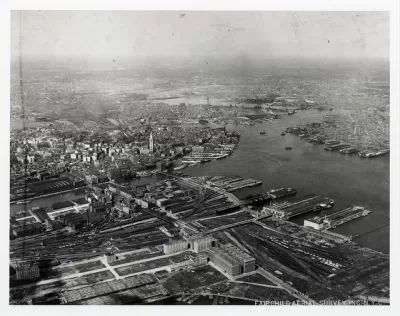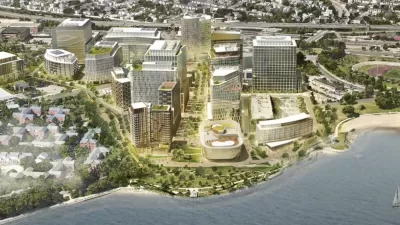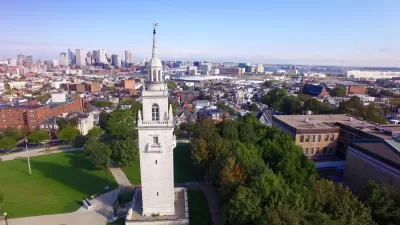An ambitious new transportation plan is yet another step in the transformation of South Boston from a gritty, blue-collar waterfront to one of the nation's most promising zones of innovation.

Five decades ago, the waterfront of South Boston reeked, and its economy was decidedly old-fashioned. Those longshoreman would hardly recognize the place now. "Southie" is now home to the gleaming Boston Convention Center, the Institute of Contemporary Art, and thousands of units of premium residential property. An estimated 17 million square feet of development is on the way.
The next set of jewels in South Boston's unlikely crown is outlined in a report that calls for the city to develop a new transportation plan for the area. Infrastructure that was designed to handle cargo ships cannot quite handle the influx of upscale residents and tech workers.
"The report advocates transportation suitable for an area forced to shoot up, not out. Some suggested transformations should be relatively easy to accomplish — Silver Line expansions, upgrades to pedestrian infrastructure and new bike facilities. Others sound far more ambitious: urban rail connections, ferry services across the water and even an internal transit route to serve only the district."
Though the report does not include specific proposals—and is not funded by a longshot—it attempts to think progressively about the city's growth and about what it will mean to build a 21st century neighborhood in the country's oldest major city.
FULL STORY: South Boston’s New Boomtown Gets an Ambitious Transportation Plan

Americans May Be Stuck — But Why?
Americans are moving a lot less than they once did, and that is a problem. While Yoni Applebaum, in his highly-publicized article Stuck, gets the reasons badly wrong, it's still important to ask: why are we moving so much less than before?

Using Old Oil and Gas Wells for Green Energy Storage
Penn State researchers have found that repurposing abandoned oil and gas wells for geothermal-assisted compressed-air energy storage can boost efficiency, reduce environmental risks, and support clean energy and job transitions.

Placekeeping: Setting a New Precedent for City Planners
How a preservation-based approach to redevelopment and urban design can prevent displacement and honor legacy communities.

San Francisco’s Muni Ridership Grew in 2024
The system saw its highest ridership since before the Covid-19 pandemic, but faces a severe budget shortage in the coming year.

Colorado Lawmakers Move to Protect BRT Funding
In the face of potential federal funding cuts, CDOT leaders reasserted their commitment to planned bus rapid transit projects.

Safe Streets Funding in Jeopardy
The Trump administration is specifically targeting bike infrastructure and other road safety projects in its funding cuts.
Urban Design for Planners 1: Software Tools
This six-course series explores essential urban design concepts using open source software and equips planners with the tools they need to participate fully in the urban design process.
Planning for Universal Design
Learn the tools for implementing Universal Design in planning regulations.
Heyer Gruel & Associates PA
City of Moreno Valley
Institute for Housing and Urban Development Studies (IHS)
City of Grandview
Harvard GSD Executive Education
Salt Lake City
NYU Wagner Graduate School of Public Service
City of Cambridge, Maryland




























